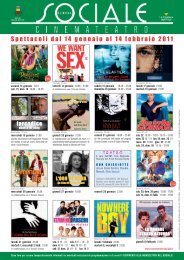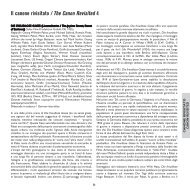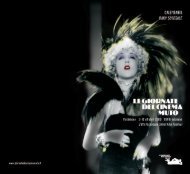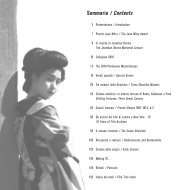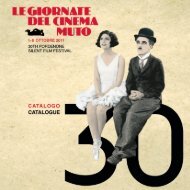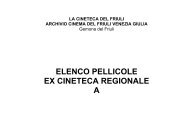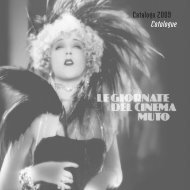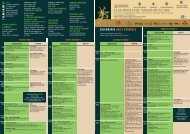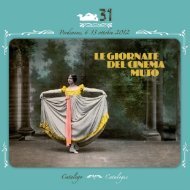Le Giornate del Cinema Muto 2005 Sommario / Contents
Le Giornate del Cinema Muto 2005 Sommario / Contents
Le Giornate del Cinema Muto 2005 Sommario / Contents
You also want an ePaper? Increase the reach of your titles
YUMPU automatically turns print PDFs into web optimized ePapers that Google loves.
Davide Turconi, Prophet of the Silents<br />
Davide Turconi, founding father and first director of the <strong>Giornate</strong> <strong>del</strong> <strong>Cinema</strong> <strong>Muto</strong>, and doyen of Italian cinema historians, died on 27 January <strong>2005</strong>,<br />
at the age of 94 (he was born on 17 January 1911). His name was known internationally, above all for the first-ever monograph on Mack Sennett,<br />
which remained for many years the only specialist study dealing with “the King of Comedy”; for his pioneering 1984 retrospective dedicated to Thomas<br />
H. Ince – one of the directors dearest to him; and for a monumental filmography of the Vitagraph Company, published by the <strong>Giornate</strong> in 1987. There<br />
were few close friends at his funeral, but such a farewell was in a certain sense appropriate to the personality of a modest and retiring man,<br />
indifferent to ephemeral fame in a discipline which, as far as he was concerned, did not attract the attention of the mass media.<br />
I had the great fortune to know Davide a long time, from 1978, when Angelo R. Humouda, director of that cultural forge that was the Cineteca Griffith<br />
of Genoa, took me in his green Volkswagen van to the tiny locality in Pavia where Turconi had inspired a new course in the study of silent cinema<br />
and taught many – including myself – the difficult art of researching the documents of the period, as well as the passion for silent cinema. His<br />
experience in the appreciation of silent cinema went back many years, at least to the Incontri <strong>Cinema</strong>tografici di Grado (1970-1972), a first essay in<br />
the formula which would subsequently find its full realization in Pordenone, and even before that, at the Venice Film Festival (with retrospectives of<br />
Sennett in 1961 and Keaton in 1963). I often recall two of his favourite expressions. The first was a reply to the incredulity of Americans who could<br />
not understand how an Italian could establish filmographies more precise and comprehensive than their own. “It’s simple,” he said, modestly. “I look<br />
in all the correspondence columns of the magazines, where readers ask for information on actors and actresses in tiny roles in films.” The other was<br />
his constant caveat, hic sunt leones (“here are lions”) – the Latin motto drawn from early cartographic descriptions of unexplored exotic lands –<br />
which he loved to use when talking of the innumerable lacunae in our knowledge of the beginnings of cinema.<br />
I consider myself even more fortunate to have passed long and thrilling hours on the night train between Genoa and Pordenone, where <strong>Le</strong> <strong>Giornate</strong><br />
<strong>del</strong> <strong>Cinema</strong> <strong>Muto</strong> had begun to develop under his guidance. With hindsight, I wish I had had a recorder to capture the endless stories Davide told me<br />
during these sleepless journeys through the Lombardy plain, after the meetings of the board of directors of the festival. Stories of the cinema, of<br />
course, of the editorial adventures of the Italian magazine <strong>Cinema</strong>, of the discovery of the Joye Collection in Switzerland, in great part restored thanks<br />
to his influence, of his sense of the need to give life to an Italian Association for Studies in the History of <strong>Cinema</strong> (established thanks to him in 1964);<br />
but also personal and sometimes intimate stories, like his participation in the Resistance, his passion for French literature, the day-to-day activities<br />
of the tourist office in Pavia which provided him with a livelihood. Between one station and the next, Davide displayed his talent as a first-rate<br />
raconteur. In between comments on the pages of Moving Picture World and trenchant judgments on many histories of the cinema written without<br />
adequate recognition of period sources, there would be observations on the role of the Catholics in the struggle against fascism, fascinating anecdotes<br />
about the cinematheques of the immediate post-war period, and ideas for retrospectives to be organized for Pordenone in the years to come.<br />
When the Pordenone silent film festival was in its novice years, and its young organizers did not know well which fish to catch, everyone went to<br />
Davide. It was like catching trout by hand, because we knew quite well that we would find ourselves again on the bus from Montebello <strong>del</strong>la Battaglia<br />
to the railway station at Voghera with a notebook full of notes, ideas, initiatives which only waited to take tangible form. As well as ideas, Davide was<br />
a prodigy of information. To call him generous (which is what is always said about a deceased person) is an unpardonable understatement: while<br />
others were concerned to maintain personal control of knowledge in the terra incognita which was early cinema, he thrust into your hands photocopies<br />
of rare documents, volumes of old magazines, books which no one else could have found in Italy at that time. And he never asked for anything in<br />
return, except to share with him the enthusiasm which always animated him and which guaranteed him a long and serene existence.<br />
With the onset of old age, Davide gradually transformed himself from primus motor of cinema history into an object for graduate theses and interviews.<br />
Then he cut out these also. Preoccupied with the health of his wife, who died a year before him, his excursions to Pordenone grew less frequent and<br />
then ceased. He had handed over his incomparable library of books on cinema to the Provincia di Pavia, which had promised to make it available to<br />
the public. In justice to Davide, the ethical standards he endeavoured to promote are now a mandate we are committed to fulfill. Davide has given us<br />
not only the necessary instruments for the study of the cinema with scientific criteria; in showing us so many paths to follow, he has also and above<br />
all given us a lesson in intellectual honesty. The moment to repay him has arrived. From this point of view, the death of Davide does not represent<br />
the end of an epoch as much as the start of a new mission. We do not feel the burden of a debt to a master, so much as a responsibility to honour<br />
it in the name of a friend. – PAOLO CHERCHI USAI<br />
On Tuesday 11 October the <strong>Giornate</strong> presents a special tribute to Davide Turconi, remembering his pioneering explorations of the Joye Collection (see “Special Presentations”, pp. 32-34).



